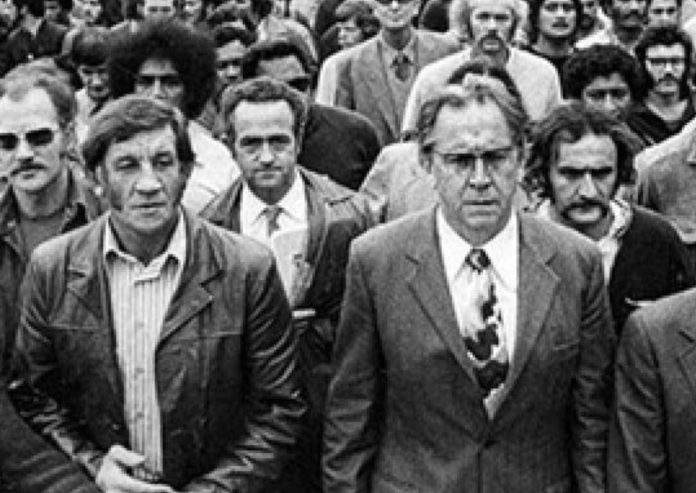I ALWAYS WONDERED what it would take to detach the New Zealand working class from Labour. Not all of the working-class, obviously, but enough to strip the party of the demographic heft that, for more than a century, has made it a decisive electoral player. Now I know, but it took a fair few wrong guesses before I got there.
On paper, it should have been Rogernomics. After such a comprehensive betrayal of Labour’s working-class base it seemed impossible that all but the most mindless loyalists would continue to vote for the party. It was the conviction that underpinned Jim Anderton’s creation of the NewLabour Party – give the ordinary working-class voter an honest social-democratic party to vote for and Labour’s electoral base would shift en masse.
Well, that’s exactly what happened in Jim’s seat of Sydenham, but NewLabour’s message fell on deaf ears just about everywhere else. Labour’s candidates reassured the residents of working-class electorates that Rogernomics had been for them. New Zealand could not have gone on the way it had been under Muldoon. Something had to be done. Our economy had to be shaken-up and set on a new, more productive path. It had all been done for them, so their kids and grandkids to look forward to something better than freezing-works and car-plants. If Mickey Savage had been leading Labour in the 1980s, they said, he would have followed exactly the same policies.
And, you know what? It worked. In Labour’s safest seats Jim Anderton’s candidates hardly made a dent in Labour’s bodywork. The workers stayed loyal right through.
Their dogged faith in the Labour Party reminded me of “Boxer”, the indomitable draughthorse of George Orwell’s Animal Farm. No matter how many times the pigs who wielded the power made the lives of all the other animals miserable; no matter how many times they slyly amended the rules of the farm (most famously from “All Animals Are Equal” to “All Animals Are Equal – But Some Animals Are More Equal Than Others”) Boxer remained loyal to the Revolution, exerting all his mighty strength to keep it going. Until, at last, worn out by his ceaseless exertions, he fell ill and was sold to the proprietor of the local knacker’s yard by the self-same pigs he had always believed in and supported.
There had been other tests of working-class loyalty. The abortion issue had sorely tried the patience of Labour’s working-class Catholics of Irish descent in the 1970s. Homosexual law reform did the same, right across the Christian denominational spectrum, in the 1980s. Like the Springbok Tour of 1981, which had pitted young, mostly middle-class, university students and their liberal middle-aged mentors, against the rough-and-ready working-class lovers of Rugby, the struggle for gay rights was overlaid with an ill-disguised contempt for the morally deficient people its promoters were struggling against.
By the late-1980s, however, the issue which had bitterly divided the traditional Left in the years immediately following the Springbok Tour, and hacked a jagged wound across the trade union movement, was turning up on the conference floor of the Labour Party. The radical quest for Māori sovereignty, and its central political demand – “Honour the Treaty” – could no longer be ignored by the party whose 50-year alliance with the Ratana Movement had given it control of the Māori seats.
That was the moment at which Labour should have grappled with the political implications of Māori sovereignty and the Treaty, thrashing them out for good or ill, until its members, and (much more importantly) its voters grasped their meaning. But, that was not what Labour did. When confronted with policy remits requiring Labour to honour the Treaty of Waitangi, conference delegates and MPs nodded sagely and dutifully raised their hands in support. Very few understood that what they were receiving and passing-on was the political equivalent of a live hand-grenade, and that, one day, the pin of that hand grenade, either by accident or design, was going to be pulled out.
Anyone who has ever wondered how the Fourth Labour Government could so blithely legislate for the Waitangi Tribunal’s reach to extend all the way back to the signing of the Treaty in 1840, or how that judicially pregnant phrase “the principles of the Treaty of Waitangi” could so carelessly have been inserted into the State Owned Enterprises Act, should wonder no more. The leaders, and the members, of the Labour Party were so ignorant of both the Treaty’s status in Maoridom, and of their country’s morally dubious colonial history, that they simply didn’t see the harm in paying lip-service to Māori demands.
Donna Awatere had put her finger on the phenomenon in her seminal Māori Sovereignty essays, published in Broadsheet:
“The strength of white opposition will be allayed by the fact that Maori sovereignty will not be taken seriously. Absolute conviction in the superiority of white culture will not allow most white people to even consider the possibility.”
Lord Cooke of Thorndon, however, had no choice but to take the principles of the Treaty of Waitangi seriously. His ground-breaking judgement that the Treaty was “in the nature of a partnership” would produce a rich harvest of subsidiary judgements and policies that, as the decades passed, would draw the descendants of the settlers who made New Zealand closer and closer to the Dock of History.
One of those judgements related to the foreshore and seabed, and came frighteningly close to tipping New Zealand into fierce racial conflict. It was only Helen Clark’s up-close-and-personal interactions with the hard men and women of the Māori nationalist movement, the people she dubbed “haters and wreckers”, that prevented the 2005 General Election from anticipating the 2023 General Election by 18 years. Clark’s effective nullification of the Court of Appeal’s decision, and her unequivocal assertion that the foreshore and seabed belonged to all New Zealanders, was sufficient to hold enough of Labour’s working-class vote to defeat Don Brash’s attempt to start what Act’s David Seymour is now promising to finish.
Unfortunately, Jacinda Ardern, possessed none of her predecessor’s understanding of the Māori nationalist movement and its revolutionary interpretation of the Treaty. When asked to summarise the Treaty’s clauses by journalists in the first months of her premiership, she could not oblige. A classic example of her party’s dangerous propensity to good-naturedly wave Māori issues through Labour’s policy check-points, Ardern simply lacked the political resources to turn back the political demands of such forceful Māori politicians as Willie Jackson and Nanaia Mahuta.
Neither Ardern, nor her successor, Chris Hipkins, had the intellectual or ideological sophistication to argue either For or Against the revolutionary ideas contained in the He Puapua Report. Nor did they possess the courage to follow Helen Clark’s example of political intransigence.
Labour made no case for co-governance because it couldn’t. For the previous 40 years it had put “all that Treaty stuff” into the too-hard, or the too-scary, basket. When the sovereignty hand grenade finally exploded, in the second term of the Sixth Labour Government, the best Labour could manage was to blame the resulting injury to the New Zealand body politic on the “racism” of the people whose votes it would need to go on governing.
Unsurprisingly, it didn’t get them. Almost accidentally, Labour discovered what it would take to make the working-class stop voting for it. Not the Pasefika working-class, admittedly, but the “settler” working-class – made up of Pakeha New Zealanders and the children and grandchildren of immigrant workers. Making those citizens feel as though they had, somehow, to justify their right to participate in shaping their nation’s future: that was the crucial catalyst for electoral defection.
Like their European and American counterparts, the New Zealand working-class has completed its historical journey from Left to Right.
And it ain’t going back.
Chris Trotter is New Zealand’s leading leftwing political commentator, with 30 years of experience writing professionally about New Zealand politics. He now writes regularly for the Democracy Project, producing his column “From the Left”.





Chris – Spot on…why would the working class vote for Labour? The Teachers, Nurses, Firefighters, Junior Doctors all had to strike to get better conditions from the Labour Government.
No, they purposely choose to go on their numerous Strikes under Labour because they had the best chance of succeeding? With National in charge they will get NOTHING but bare minimum CPI rises which everyone knows that CPI are manipulated to make them lowball figures? The Days when the Nurses & Teachers etc could expect big pay increases are OVER under National!
Antforce62 – Some what correct…but, Labour decided to offer workers under the rate of inflation…until we went on strike.
In reality no public servant should ever vote National but unfortunately many of these nurses, teachers etc. do vote National and God only knows why. Beneficiaries probably also vote National in the mistaken belief that they will be better off. Unfortunately Chris Trotter’s version of the “working man” is very far removed from reality these days. All the big industries have gone ,collectively disbanded in the name of progress. No one in their wisdom saw the huge societal horror in these decisions. Many communities condemned to a life on the dole offered work they were incapable of and couldn’t afford to take because it didn’t pay enough money to live on. Wouldn’t it have been better to keep these people in work it wouldn’t have cost the country much more than the dole and it would also have improved peoples health and welfare saving money in the health system. Don’t blame the working man for the ills of decision making far above his pay grade but blame the politicians et.al for cutting communities off at the knees then blaming them for not going to work.
I agree; the working class that supported labour in the 30’s was a far larger slice of the population than it is now, especially in terms of manual work.the labour political class has moved with that trend toward secondary and service industries as fewer people are required to do what factory work has not been exported to China and other Asian countries due to greater mechanisation and primary industries have gone the same way. The labour party is made up of the same middle class intellectuals and bureaucrats that they represent. The working class of Chris’s memory is now largely unemployed.
D J S
+100
Is it the working class or the party charged with representing the working class that has moved from Left to Right. I firmly believe its the latter.
Interestingly, or ashamedly, I didn’t side with New Labour. back then I still believed that Labour was either the best chance to, or one day would, reverse the neoliberal wrongs. I was politically naive and ignorant back in those days. Boy, what a New Labour type party could do for the Left now (bent system aside).
all it took was repeated LINO betrayal of the working class
Not only betrayal but also blatant lies.
So the consequences of this are impactful to say the least. If the issues of Māori co-governance have truly driven the working class pakeha and recent immigrants to the right then despite the TPM and Green success in aggregate the left are fucked in the long run.
” The Green Party could surpass Labour at the next election if it does not get its act together, former Green MP Sue Bradford says ”
Bradford told Morning Report Labour has been taking more of a middle-ground approach to its policies.
“At this point, if Labour goes on like it is, I think that there’s every chance that Greens can even potentially overtake them in terms of percentages and numbers in the House, unless Labour does get its act together and become a lot clearer about who they stand for…”
https://www.rnz.co.nz/news/political/500530/greens-could-surpass-labour-at-next-election-unless-it-gets-act-together-former-mp
Only if we drop the voting age to thirteen and bring in a voter cut off age at 64.
Experience is a real thing, believe it or not.
“Like their European and American counterparts, the New Zealand working-class has completed its historical journey from Left to Right.
And it ain’t going back.”
Ha. It won’t much like for long the place that it has ended up in.
So, it’s either back to the left again or on forward into demagoguery and fascism. Even as I type the precedent is being set in the USA and elsewhere.
Bill Andersen in your photo.A real warrior for the working class.
Labour are ‘House and Garden’…career politicians these days.
A sinecure..or..bust.
Like in most countries, the working class have been totally demoralised since the early 1990s. But Corbyn and Bernie proved they will still vote left — at the very moment when their voice can no longer be suppressed.
Anderton’s N.L.P. might have turned out differently if the N.Z.C.T.U. had allowed a large wave of strikes against the Birch Employment Act, while there were still thousands in the streets protesting against it (and the Reaganomics agenda of Douglas/Richardson, in general). That sell-out, and subsequent defeat, was highly demoralising.
It’s the propertied class and the underclass now. And, yes… the underclass is turning.
Sandwiched in there is the political class trying to play both ends against the middle to maintain the status quo.
No; the political class is part of the propertied class.
How does that fit into an indigenous narrative based on collective ownership of property ?
it doesn’t
Exactly. Trying to shoehorn Maori into left/right pakeha class wars doesn’t wash.
As Damien Grant noted on The Working Group, the Left has lost office but have they lost power? The “haters and wreckers” are still there more readily aided and abetted by civil servants than ever. Will this government be able to rein in our civil servants or not?
I think this is a classic hind sight exercise. Chris is layering his personal views on later developments over earlier events.
To me the NZ working class over 4 decades has behaved similar to those around the world subject to neo liberal individualism, structural dislocation (job loss, private capital penetration of public infrastructure) massive union busting and post modernist philosophy–where any thing can mean anything.
Academics long predicted the “atomisation” of the working class under neo liberalism, the down grading of collectivism, whole new categories of workers arising, including the unpaid intern phenomenon and precariat replacing the staunch one job for life types of earlier times. The digital world has massively encouraged people to go down their own rabbit holes also.
Labour crapped out this time because they were unable and unwilling to change to the new requirements of 2023. Thankfully Greens and Te Pāti Māori demonstrated that not everyone in this country is a stunned mullet, incel, gun lover, sheep shagger or in thrall to the parasite class.
TM have to agree, Labour failed to adapt.
Reading Chris article this comment struck me as totally wrong. New Zealand working-class has completed its historical journey from Left to Right.
This comment indicates that there still is a working class. Correct, but have they gone to the Right?
That statement assumes that working class interests are aligned with those of the the sponsors of the Right, the owners, landlords, capital.
Very unlikely Mr Trotter. Get back into line and start aligning Labour with the currently unrepresented class.
Well said TM. I think you have the nub of the matter.
So the Labour party moved right and now their supporters have too – but not to vote for Labour?
It’s sounds confusing but basically everyone is right-wing these days, with even the Greens buying into neoliberalism to a degree or two.
The working class need a leader to emerge who has a real vision for their future – at the moment all they’ve got is right wingers who help them express their dislike of the managerial class running Labour but who screw them over economically.
Sadly the idea that the the working class, Maori people and other minorities are all victims of a greedy elite seems to be lost on almost everyone – except the greedy elite who know all about driving a wedge between their many enemies.
” Sadly the idea that the the working class, Maori people and other minorities are all victims of a greedy elite seems to be lost on almost everyone – except the greedy elite who know all about driving a wedge between their many enemies ”
Yes and Norm Kirk had it right when you drill down to the majority of New Zealanders.
” Basically there are four things that matter to people: they have to have somewhere to live, they have to have food to eat, they have to have clothing to wear, and they have to have something to hope for ”
In 2023 those aspirations haven’t died for all of us that don’t enjoy the privilege of wealth , status and financial security and that is the majority have no representation or voice unless you are a member of the Greens and that is fraught with identity and woke diversions that in no way acknowledge the real economic war of destruction being waged against so many all in the name of privilege is just not where most hard working people and their oppression are at.
Labour lost me when my kids at a ‘standard’ primary school were being repeatedly told to ‘try again’ when saying ‘morning’ to their teacher until finally using ‘morena’ . . have no problem with Te Reo being taught in schools at all but I do when in their day to day lives they are increasingly being forced to not speak their own language.
I have some sympathy James, it is not right to force culture and language upon anybody. Ask Maori, they know. That said I am in favour of lingual immersion beginning at primary. Given the demographics English Maori and Mandarin might be a good start.
What did Welsh do? Bi-lingual even though they were really keen to hold onto the lingo? It will die if Maori is not used along with threads of understanding loosely connecting us all. I just don’t like indigestible lumps dumped on us and I have little trust in apparent innovations from government. There is space for foot and side notes on the documents setting out policy and they would show the extra outcomes not immediately obvious.
Great post Chris! Thanks
So correct in so many ways, although Cooke said the Treaty was “akin to a partnership” which, depending on which definition of akin you’re using it could mean ‘related’ to a partnership or ‘similar’ to a partnership. Either way, those were very loose words for a ruling on an important constitutional issue.
A couple of points you could also consider:
Labour lost all its working-class representation decades ago. Offhand I cannot think of a real working-class person in the upper echelons of the Labour party for the last couple of decades. The current crop are mostly failed academics, ex-teachers and light weights who joined the party as students then rose up the ladder on someone else’s coattails. Likely because they ticked a gender or racial box. None have done a day’s work in the sun, that’s for sure!
At the same time, ‘class’ has become unimportant in New Zealand. We live in a wonderful country where a poor kid can do an apprenticeship, become a tradie, start his own business and then become seriously wealthy over time. Are these millionaire plumbers working class? Their clothes look working class but their bank balances less so. It seems the only people whining on about class are those with terminal careers in media or academia. LOL.
Most importantly, Labour has lost the support of immigrants from Asia and India. The results of the electorates around Auckland tell us a lot: Losses in Takanini, Maungakiekie, Roskill, New Lynn and only marginally scraping through in Mt Albert and Te Atatu. These electorates have a young, aspirational demographic who don’t want to find themselves being cast as second-class citizens in their newly adopted country and don’t appreciate their uncle being hit or stabbed in a raid on a corner dairy. Who can blame them?
“We live in a wonderful country where a poor kid can buy a lottery ticket, win the power ball, buy his own property portfolio and then sit on his arse for all time.”
Better if you had provided such honest prospects.
Maybe you would have achieved more in life if you didn’t have such a negative attitude?
As always life isn’t fair because not all parents are equal, but personal effort can still overcome initial adversity. A previous Prime Minister was brought up by a solo mum in a state house and the nation’s richest individual left school at 16 and became a tow-trucker and panel beater. Last week I was talking to a carpenter/builder who travels around the country in his own helicopter.
It is time to strike, riot and occupy ghost homes. Take back what they took.
This is information about housing – it is Not a suggestion that NZs or anyone should do it in NZ/AO or elsewhere or to provide a method of coping with housing shortage and inequity. It is a set of links for thinking about and discussing and part of being informed about issues.
FYI – https://en.wikipedia.org/wiki/Squatting_in_England_and_Wales
https://www.bigissue.com/news/housing/squatters-rights-in-the-uk-everything-you-need-to-know/
https://www.propertysolvers.co.uk/homeowners-hub/legal/squatters-rights/
https://www.gov.uk/squatting-law/squatters-rights-to-property
https://www.tntmagazine.com/archive/the-legal-squatters-discover-alternative-cheap-rental-options-in-london/
https://www.lejournalinternational.fr/The-squat-An-alternative-to-housing_a2740.html\
https://www.lensculture.com/articles/corinna-kern-a-place-called-home-the-squatter-communities-of-london
https://www.jstor.org/stable/2563131 – Intraurban Squatting in London Kevin C. Kearns
Workers don’t relate to student politicians who have never ever got their precious little nivea hands dirty.
That photo, in the crowd, i would have been, Chris, not you, even in those days, truth, expect you not to what print publish, truth, not there. We where.
No laugh, Anderens, minder, bag of bone, five six, toss that away/
And he was, yet, knowing, don!t upset.
We have, lost. Come their loss, with a possible double, or trifecter, year maybe.
Anyway,prolatariat, you labour lot, get your care knowing about.
Jesus Snark, unreadable!
You really should learn words better, you are a Labour voter for sure Snark lol
Don’t be petty and prissy Im right. You don’t know that until youve heard others POV however they spel it.
There is some substance in this, but Māori issues are complex, and they are by no means the only reason voters abandon Labour.
Others include a stance on gender issues that by no means enjoys broad societal support, a failure to address housing meaningfully (ie to the extent it influences prices and rents), failure to contain low-quality immigration (unskilled & fraudulent), failure to respond meaningfully to climate and environment issues, and many more.
Will/can someone translate “snark’s” posts for me?
Really the current Labour Party are an anachronism,no one knows what they stand for,they have become irrelevant.
Trev I can translate “snarks” posts for you,utter nonsense.